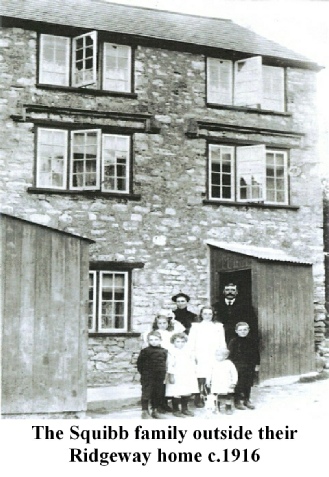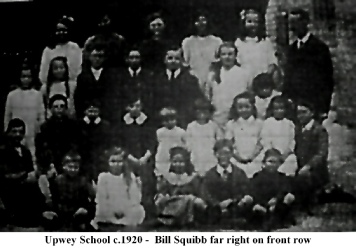Family Life
The Squibb Family 1910's - 1920's

Some of Bill Squibb's memories as told at the Upwey School Reunion in November 2006 and from a visit by Sue Virgin to his Weymouth home in Feb 2007.
 Bill (born in 1912) was one of 7 children living with parents at 6 Old Roman Road opposite Teddy Haines' blacksmiths. Teddy lived a little further up Old Roman Road.
Bill (born in 1912) was one of 7 children living with parents at 6 Old Roman Road opposite Teddy Haines' blacksmiths. Teddy lived a little further up Old Roman Road.
In the photograph, Bill, aged about 3yrs is in the white smock. The wooden lean to on the left was a laundry shed built by Father. There was no electricity and water came from an outside tap shared by the 5 houses.
The houses were technically in the parish of Bincombe, and belonged to Cambridge College, who also owned a lot of land in the Bincombe area (they still do).
Bill remembers the rent being 2s6d a week. There were 6 rooms in the house, 2 on each floor.
Bill's Father, George, worked as a stonemason for Great Western Railway at Weymouth; believed to be one of the last apprentices employed by them.
Bill's father was conscripted in 1917 despite being 40yrs old and a family man. Sadly he died within 3 weeks of being sent to France, leaving Mrs Squibb with a young family and little else.
The Upwey parish magazine noted:
It was with great regret that the village heard that Mr George Squibb had fallen in the great battle of the advance in France. Living in the Bincombe houses on Ridgeway Hill the family is not, properly speaking in Upwey Parish, so his name does not appear on our Roll of Honour, but it must always remain an honoured memory in the village. He was one of the older men, who belonging to the National Reserve, responded to the call of their country as soon as war broke out, being used at first for Home Service duty. But when the age was put up, he joined the 4th Dorset's and was soon in the fighting line. At the time of his death, he had seen a great deal of service. He believed very firmly that God would answer the prayers of his wife and children by bringing him safe through. But the answer for them too has been that the cup may not pass away from them unless they drink it, and with their Redeemer 'Thy will be done' and that His angel from heaven will strengthen them through their agony. May 1917.
George Squibb's name is recorded on the memorial plaque in the foyer of the Upwey & Broadwey War Memorial Hall in Victoria Avenue.
Eldest daughter, Elsie, aged 14 helped to bring up the family. To help make ends meet Mrs Squibb took in sewing and ironing. Bill remembers sitting up with her when she was sewing by the light of the fire so that he could thread the needle for her.
Bill also remembers Canon Gildea who regularly visited all widows of men killed in the First World War and living in the village, regardless of their religion.
 He started school at 3years old (Mother said you're getting under my feet -
He started school at 3years old (Mother said you're getting under my feet -
The Hounds (South Dorset or Cattistock Hunt) met at the Wishing Well 4 times during the winter. At 11am the older children were let out of school to follow the hounds, they had to be back by 1.30pm.
The school used flatish areas on Windsbatch and Bayard Farm to play football and other games. On 20 July 1923, when the Prince of Wales visited the Wishing Well Bill remembers lining up and singing 'God Bless the Prince of Wales'.
One of his best friends was Bill Hansford -
Bill remembers gazing at TE Shaw's (Lawrence of Arabia) Harley Davidson motorbike when it was parked outside of Brook House. Often TE Shaw would come out of the house, probably to make sure none of the boys touched the bike, although he never spoke to them.
At about 10yrs old Bill and friends often walked to Weymouth to watch the football.
After leaving school at 14 yrs, Bill worked for Mr Baker at the local Bakery on Dorchester Road for 6 years. The working day began at 5.30am and ended at 7pm for 30/-
Other people who worked at the bakery included Ben Trevett, Eddie Carpenter, Jack White and Orchard.
Three times a week Bill went on the bakers round with Ben Trevett in a van covering the villages of Bincombe, Broadwey, Nottington, Buckland Ripers, Radipole and Lodmoor.
Eddie Carpenter delivered with a 'horse-
Bill's ambition to join the Great Western Railway was achieved in 1932, and he worked for them for 50 years. Firstly he was a porter at Weymouth and worked his way up to Station Master at Marston Magna.
Working for the railways was a family tradition as Bill's Grandfather, Father, Father's 3 brothers and Mothers 4 brothers, Bill and his 2 sons all worked as railwaymen.
The railways came to Weymouth in 1857, so it's likely that Bill's grandfather was among the first employees, working in the engineering department at Weymouth.
Bill always had an interest in scripture and came top of the class at school. When he was about 20yrs he began to preach and continued for 60yrs
Bill is still a member of Came Down Golf Club, although he no longer plays. He began playing golf at 10 years old and continued until he was 87 years old. Around 1922 Bill was caddy to the Club Professional Reg Whitcombe who paid him 1s6d, which Bill gave to his mother.
As he was growing up on Ridgeway he remembers Herbie Cox at the Royal Oak and Samways' shop on Church Street. Also the pond with beautiful lilies up on Bincombe Heath.
Bill also remembers Cecil Trevett and the Clements girls who lived in Primrose Cottage, Violet, Elsie (who was a teacher at Upwey when Bill was at school) and Margery. Mrs Wallace was landlady at The Ship, Jack Marsh at the Masons; Miss Jane Corbin and Miss Alice Dunn at the Post Office.
Butcher Bowditch's shop in a passage at the side of his house in Elwell Street. He had a field behind the Masons Arms where he kept animals prior to slaughter. The slaughter house was the building opposite the butchers shop.
Near the butchers was the general store which sold everything and in Bill's memory was run by Bithrey, Barber and Newberry at different times.
Fred Harris and Mrs King 'watched' the Wishing Well. Mrs King was also the village nurse. There was a tea garden at the Well.
